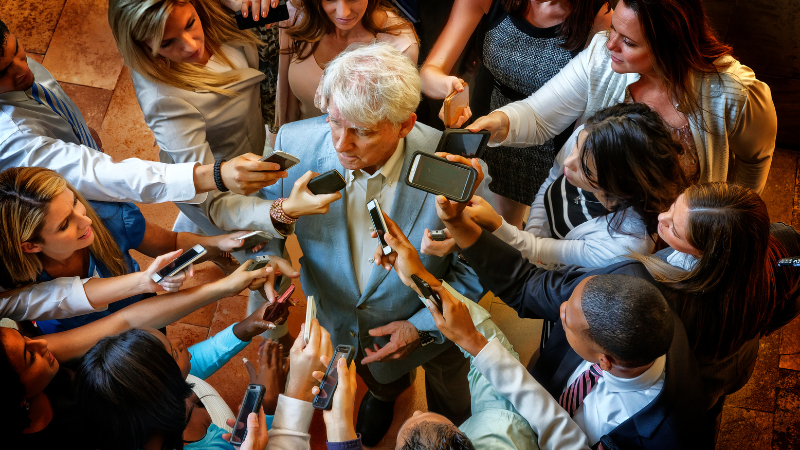Dealing with Media - Part One
- 8/4/2022 7:30 am

The following is the first of a two-part series on “Dealing with Media.”
Part two, “What to Do During and After the Interview,” will run in the September issue of PartnersNews.
As with any kind of risk management, the better prepared you are in advance of an event, the better the outcome for all involved. This principle is especially true when dealing with inquiries from the media.
We all see stories where spokespeople respond to a media question with the evermore dull “no comment.” Many stories also contain the sentence “we reached out to (Insert Organization) for comment, but our calls were not returned.” This kind of language is an immediate signal to readership that the interviewee was unprepared or unresponsive, and offers the impression that the interviewee might have something to hide. Either way, it’s not a good look.
Some companies avoid talking with the media because they fear the interview process, don’t know how to prepare or, worst of all, believe that simply choosing to ignore a reporter will “kill” the story. This rarely happens. In actuality, the story will likely run anyway, possibly with comments from another, less reliable source, even a competitor with an ax to grind.
With solid preparation for an interview, you will not only be more confident and comfortable speaking with the media, but you will also be able to effectively communicate your story to those who matter most — your audience.
If you receive a call from media, the first thing to do is find out a few simple details:
- The reporter's name. This is essential to reviewing their past articles and the type of story they typically send out.
- The outlet they represent. This can be print or broadcast. Find out up front whether you're talking to a studio down the street or one in the heart of Manhattan.
- Their story deadline. Respecting the reporter's time and process will go a long way toward building a positive relationship, and also give you the change to prepare before launching straight into an unexpected conversation.
Before speaking with a reporter, you must know exactly what you want to say and how you want to say it. Contrary to popular opinion, you do have the ability to steer a media interview. This is because, while you have zero say over what questions you are asked, you have 100% control over how you respond.
If you know you are likely to receive questions about an event or topic, here are a few tips to help you define and polish your response to the media:
- Distill your messages down to short, memorable statements. If you could place your key points on a 3 x 5 index card, what would you include? Do they speak to your audience? Are they honest, meaningful and to the point?
- Make your responses interesting to the audience. Use analogies. If possible, personalize your message so that your audience can relate to you and those you represent.
- Avoid jargon. Will the audience understand the everyday lingo and acronyms that you and your colleagues are accustomed to using? It is highly unlikely, and if you are unsure, leave them out.
- Practice, practice, practice. Practice again. By having someone else play the role of the reporter, you can rehearse your delivery. Avoid memorizing responses as it makes people appear pompous and disingenuous.
- Have someone play devil’s advocate with you. Anticipate the issues and questions the reporter will present. See how well you can handle any curve ball that might come your way.
Keep in mind that interactions with media are opportunities to showcase your entity, the services you offer and the expertise of your staff.
In the next issue of PartnersNews, we’ll talk about what to do during and after the interview.
Categories
-
Annual Report
(5)
-
Audit Requests
(2)
-
Board of Directors
(19)
-
Claims
(26)
-
Cyber Extension
(4)
-
Cyber Security
(27)
-
Dividend
(7)
-
EHS Hero & HR Hero
(16)
-
Employment Practices Liability
(26)
-
Excellence In Risk Management Awards
(18)
-
Fireworks
(1)
-
First Responders
(9)
-
Grants
(23)
-
Law Enforcement
(16)
-
Local Government Risk Academy
(4)
-
Loss Control
(105)
-
Member Services
(11)
-
Message From the President
(20)
-
MTAS
(10)
-
Municipal Sewer System
(4)
-
Partnering for Success Webinar Series
(31)
-
PEP Staff
(32)
-
Qualified Immunity
(3)
-
Risk & Insurance Symposium
(42)
-
Safety Program
(56)
-
Scholarships
(20)
-
Social Media
(2)
-
Training
(76)
-
Underwriting
(32)
-
Workers' Compensation
(27)
- Annual Report (5)
- Audit Requests (2)
- Board of Directors (19)
- Claims (26)
- Cyber Extension (4)
- Cyber Security (27)
- Dividend (7)
- EHS Hero & HR Hero (16)
- Employment Practices Liability (26)
- Excellence In Risk Management Awards (18)
- Fireworks (1)
- First Responders (9)
- Grants (23)
- Law Enforcement (16)
- Local Government Risk Academy (4)
- Loss Control (105)
- Member Services (11)
- Message From the President (20)
- MTAS (10)
- Municipal Sewer System (4)
- Partnering for Success Webinar Series (31)
- PEP Staff (32)
- Qualified Immunity (3)
- Risk & Insurance Symposium (42)
- Safety Program (56)
- Scholarships (20)
- Social Media (2)
- Training (76)
- Underwriting (32)
- Workers' Compensation (27)